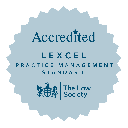- Home >
- Paralysis Claims
Paralysis is a life-altering condition with the potential to restrict a person’s movement and autonomy forever. If you have been paralysed by a misdiagnosis from a medical professional or a significant error during spinal surgery, you may have the right to compensation.
Our medical negligence solicitors have helped clients affected by paralysis secure their financial future for over 30 years. Handling your claim with absolute sensitivity, professionalism and attention to detail, trust our experts to achieve the settlement you deserve so you can move on from what happened.

Do you have a paralysis due to medical negligence claim?
A diagnosis of complete or partial paralysis can turn your world upside-down, leading to a life of long-term care and rehabilitation. But when this is caused by a medical professional’s breach of duty, we know how much harder it can be to move on.
Whether your paralysis was caused by a misdiagnosis of Cauda Equina Syndrome, delayed treatment of a stroke, or surgical errors around your spinal cord – our solicitors work tirelessly to determine the cause of your injury and recover compensation to protect your financial future.

The specialist paralysis claims solicitors for Essex & East Anglia
Since 1993, our legal representation has helped hundreds affected by paralysis get the justice they deserve – and we can do the same for you.
We meticulously review every piece of medical evidence and work with impartial experts to prove your claim, guiding you through every step on a ‘no win, no fee’ basis. With 96% of claims resolved outside of court, trust our track record to achieve a fair, efficient outcome for your long-term quality of life.
What does our paralysis medical negligence claim process look like?

A free initial consultation
Call us, request a callback or complete our online form and we’ll assess if you have a valid medical negligence claim.

Funding your claim
Discover the ways we can fund your claim without you paying a penny at any stage of the process.

Investigating evidence
We gather medical records, witness statements and more to learn what happened to you and prove your claim.

Instructing independent medical experts
We work with impartial, experienced medical experts to establish whether your injuries were due to substandard medical care.

Valuing your claim
We assess your health and financial losses to accurately estimate how much compensation your claim is worth.

Presenting your case
We contact the Defendants and the Courts on your behalf to set out your allegations and receive a response.

Negotiating a settlement
We work to achieve a fair settlement for you outside the courtroom – this is how 96% of our cases end.

Preparing for Trial
If we must proceed to Trial, we fully prepare you for what to expect so you receive the right result in court.
FAQs about paralysis medical negligence claims
What is paralysis?
Paralysis is a loss of muscle function in some or all of your body. This happens when something damages the connection between your brain and your muscles. Paralysis can be either complete or partial, and affect one or both sides of the body.
Paralysis is either categorised as localised or generalised. Localised paralysis refers to when a specific part of the body is paralysed, such as the face or hands. Generalised paralysis affects larger areas of the body.
What are the four types of paralysis?
There are four main types of paralysis:
- Monoplegia: one limb is paralysed
- Hemiplegia: the arm and leg on one side of the body is paralysed
- Paraplegia: both legs are paralysed
- Quadriplegia or tetraplegia: both arms and both legs are paralysed
The scale of a person’s paralysis will influence the amount of compensation they can claim if their injury was caused by clinical negligence.
How can medical negligence cause paralysis?
Most medical negligence claims for paralysis are due to a healthcare professional misdiagnosing medical conditions that may cause paralysis, rather than actions that lead directly to paralysis itself.
For example, your GP may fail to diagnose Cauda Equina Syndrome – a compression on the nerves at the base of the spine that branches out into the lower limbs. If wrongly diagnosed as back pain or a less serious spinal injury, the resulting delay in treatment may cause permanent nerve damage and significant paralysis.
Another potential cause is delayed diagnosis or treatment of an oncoming stroke. Stroke paralysis can occur when damage is done to the brain, leading to weakness or paralysis on one side of the body.
Although rare, paralysis may also be the direct result of surgery errors, particularly relating to head or brain injuries, or spinal injuries and procedures that affect the spinal cord - including negligent orthopaedic surgery. Mistakes that can lead to paralysis include:
- Overstretching or cutting a nerve
- Failing to notice internal bleeding
- Cutting a vessel which may restrict blood supply to a nerve
At Gadsby Wicks, we thoroughly review every piece of medical evidence available to determine the causation of your paralysis. This is a crucial part of the puzzle, and how we prove you have a valid claim.
How do I prove that medical negligence caused my paralysis?
You must establish three factors to prove you have a legitimate paralysis compensation claim:
- There was a breach of your healthcare provider’s duty of care
- You suffered pain, injury, financial loss or damage
- Your suffering was directly caused by your healthcare provider’s breach of duty
All clinical negligence claims are determined on the Balance of Probabilities. This means that you must prove that it is more likely that your injuries were caused by the Defendant’s negligence than not.
As specialist medical negligence solicitors, we will gather and assess all available evidence connected to your claim to establish whether it is valid, including:
- Medical records
- Personal statements
- Witness statements
- Photographs
We also consult with relevant, impartial medical experts, who advise on whether a healthcare professional breached their duty of care and the extent of your injuries. In paralysis claims, we will almost always speak to an independent neurologist.
A neurologist will advise on when the window closed to prevent your paralysis, and whether anything could or should have been done before this.
For more information on how we prove your paralysis claim, read about our legal process for making medical negligence claims.
View our National and Essex Medical Negligence Statistics post for more industry insight.

What is the time limit to make a paralysis compensation claim?
In most paralysis claims, you have three years from the date of your injury, or the date you became aware of your injury, to launch your claim. However, there are exceptions to this rule:
- If the claimant is under the age of 18, they have until their 21st birthday to start their claim
- If the claimant is considered mentally incapable, there is no time limit
In all circumstances, we advise you to reach out even if your three-year time limit has expired. Every claim is at the court’s discretion, so it may still be possible to pursue your case.
What can compensation pay for following a successful paralysis claim?
The purpose of compensation is to help return someone to the position they were in before their injuries or, if that is not possible, support changes to their life moving forward.
With this in mind, there are numerous one-off and ongoing costs the compensation from a successful paralysis claim can cover, including:
- Adaptations to help the claimant move around their home, such as stairlifts and hoists
- Installation of wet rooms
- Acquiring a new adapted home if the current living space is unsuitable
- Vehicle adaptations
- Aids and equipment, such as wheelchairs and braces
- Long-term care costs
- Physiotherapy, hydrotherapy and rehabilitation costs
- Loss of earnings
- Travel expenses
For professional legal advice on what compensation can achieve for you or your loved one following a medical mistake, start your claim with our team today.
Contact our expert paralysis claims solicitors
If you or someone you care about has been left paralysed by a medical mistake, speak to someone about your options. Our team is here to listen and advise you on your next steps.

Lexcel accredited medical negligence claims solicitors
We are proud to be a Lexcel-accredited practice. The accreditation is a mark of quality and comes directly from the Law Society.
A recent assessment described us as a “Centre of Excellence” and we continue to operate to the highest standards across all main areas of our field. These include client care, case management, financial management, structure and strategy, people management, risk management, information management and file management.







